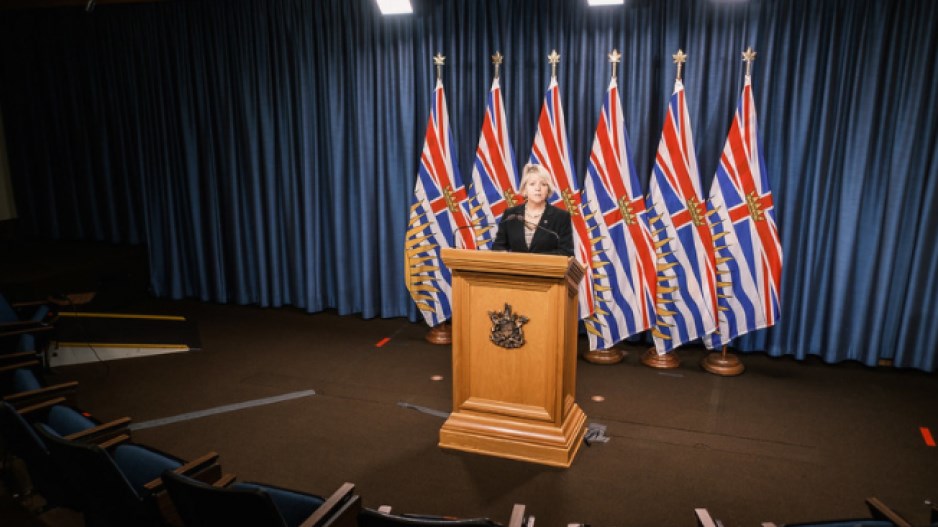In an initial news conference about COVID-19, our Provincial Health Officer revealed she was “tired.”
Dr. Bonnie Henry worked on the SARS outbreak that lasted six months. That was 17 years ago. The Ebola outbreak had ended in 2016. COVID-19 had yet to be declared a global pandemic and nobody had died in B.C. Why was she tired already?
In a battle barely begun, we needed vigor, not fatigue. As a crisis manager, I questioned if Henry was the right leader.
She proved me wrong. In the first wave, B.C.’s numbers were low. Her hero status inspired international media profiles and consumer goods. Her trademark, “Be kind, be calm, be safe,” became our battle song. I praised Henry in BC Business magazine.
That was then. By the second wave, I came back to my initial thought about Henry’s leadership.
Effective crisis managers are direct, honest, and humble if needed. In analyzing Henry’s media briefings, a pattern emerges, one that has prompted some on Twitter to dub her a ‘spin doctor.’
Spin doctors deliberately reframe, modify, or confuse the facts. Spin leaves a false impression. Here is a selection of Henry’s spin:
Masks: In 2016 in the BC Medical Journal, Henry wrote about masks in hospitals: “There is evidence that masking will reduce influenza virus transmission … at least as much as handwashing.” Yet when the pandemic started, she claimed, “Masks can lead to more risk” calling them the “least effective of the layers that we need.” She doubled down: “It’s not something that, if I am out in public, is going to protect me in any way.”
By November, Henry was doing damage control, though she didn’t admit it. She authored a piece for the Vancouver Sun in which she claimed she had been “clear” about masks all along: “Mask use is important ... a significant part of the layers of protection that can help protect us. I wear a mask, and I expect each of you (who can) to wear one too.”
Nowhere did she mention that she had initially counselled the opposite.
Even just a few weeks ago, Henry muddled the message when announcing a mask policy for schools. All she had to say was the word ‘mandatory,’ but that would have meant conceding to vocal critics who had long demanded a policy for schools. Instead, Henry said she would “support mask-wearing,” which made the policy sound optional and left the media and BC Teachers’ Federation scrambling for clarity.
BCTF President Teri Mooring told CTV News: “This is yet another example of the communication problems we’ve been experiencing all along.”
New Year’s Eve: Henry blindsided the restaurant industry the day before New Year’s Eve when she banned liquor service after 8pm, infuriating owners who had invested in liquor and would now lose much-needed revenue. Rather than be straight about her decision, Henry alleged she had been “hinting” at restrictions for several weeks: “I don’t think it came out of the blue.”
The restaurant industry confirms otherwise.
Spring Break: Before Spring Break, B.C. rates surged above the national average and infectious disease experts warned that intervention was needed. Henry surprisingly relaxed restrictions, and COVID-19 intensified.
After Spring Break, Henry offered a confusing response about her decision: “It really has been the dramatic increase in the last five to six days that has shown us we're on a trajectory — rather than where we have been which is rumbling along at a rate that was quite high, which worried me because when you have 500 cases a day — the probability of it going up exponentially is much higher.”
In other words, she knew the numbers before Spring Break would act as a spark. In her response, she failed to acknowledge her misstep.
Airborne transmission: Even with leading global health authorities sounding the alarm about airborne transmission, Henry downplays the science. When reporters asked if she would update B.C.’s language about airborne transmission, she rambled through a confusing 418-word response rife with technical jargon in which she only used the word ‘airborne’ once and that was to define it, not state outright that it is an issue.
Recently in banning indoor dining and recommending people work from home, she said, “Gathering indoors is the greatest risk to all of us right now.” In that one-hour media briefing, she made no mention of airborne transmission.
Spin is dangerous in a public health emergency. Henry is not the person who can lead us back from this crisis. She admitted more than one year ago that she is tired. Perhaps it is time to give her a break.
Renu Bakshi ([email protected]) is a former long-time journalist now working as a senior communications strategist specializing in crisis management and media training.




